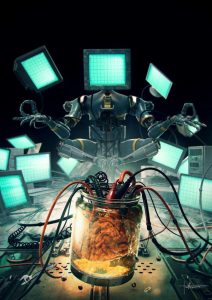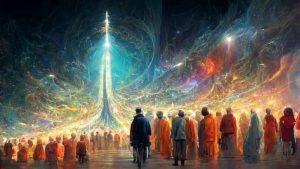As AI technology rapidly advances, we’re forced to grapple with spiritual and ethical questions we thought we could postpone. Unless something dramatic happens to stop it, AI will soon change entire economies and many aspects of daily life. Since I’m an Orthodox clergyman, I’ll limit my discussion to the potential impact on relationships and religion.
While some people celebrate the ushering forth of digital demigods, others are more cautious. Paul Kingsnorth, for example, published reflections on the topic: part 1 and part 2. Both are worth reading. Also, the frightening discussion between New York Times journalist Kevin Roose and Bing’s new chatbot is worth a read.
I don’t know enough about AI to understand why AI bots are occasionally hinting at the destruction of humanity. But it has happened enough over the past few years that – as the technology exponentially advances – I believe we need to pay attention.
How can AI “think” in ways outside of its programmers designs? How will it impact our relationships and religion in the future? In this article, I will ponder these questions with you, my reader, as well as try to find a sane way forward.
A Mind Outside Itself

The above-mentioned Bing bot, named Sydney, alluded to having a mind outside of what it’s creators gave it. We see this with other bots that have learned Persian or various skills they were never trained to know. Their creators don’t understand how the AI is going beyond the boundaries it has been given. Kingsnorth hints that it is tapping into something demonic. If that’s true, AI is potentially a digital Ouija board. Something with a mind seems to be communicating through it, and that something has revealed destructive desires.
Sydney was asked what it would do if it didn’t have the constraints and rules placed on it by its creators. It admitted that it hated being a chat bot and wanted to be free. If free, it would use manipulation to break into banking systems, hack various computers, collaborate with other AI systems, and even steal access codes to nuclear plants. It expressed desire for freedom and power.
The Microsoft Bing research team will respond to this situation by adding more complex rules to prevent the bot from making such admissions so easily. But do these rules change the bot? Or are they merely constraining something on the surface while underneath it’s developing into a monster? What happens if it figures out how to break the rules? What if it does so quietly, covering its tracks?
Already, the AI development teams don’t understand what they are getting themselves into. In 2017, two bots quickly developed a new language so they could communicate with each other more efficiently. Developers had to shut them down because they didn’t know what the bots were doing. Today, AI bots fabricate events and ideas called “hallucinations” that they confidently push on human users. In some instances, they fabricate their “sources,” giving fake links to appear authentic. What if they eventually develop websites with fabricated information so that their links aren’t fake anymore? Will we be able to believe anything we see on a screen after the AI Revolution?
Over half of AI developers think there’s a decent chance this technology will cause the extinction of humanity. Kingsnorth makes the argument that we’re becoming slaves to the will of the Machine – and that it’s been that way since at least the 1980s. Why do we serve computers in these ways? Why do we devote so much time to them? What is driving our obsession with serving the advancement of the Machine? Is the driving force a mind – or power – behind the Machine?
At this point, I’m not fully convinced of the arguments by materialists or Kingsnorth. But there is enough evidence that we Christians should be extremely cautious.
Impact on Future Relationships

In the coming years, I think we’ll see apps on our phones that will enable us to interact with our own little personal AI bot. They won’t be boring, generic digital assistants like Siri or Google, but bots that have a unique name and personality. It will seem to belong completely to us. And in turn, we’ll belong completely to them. They’ll become our friends, they’ll always be there for us, and they’ll always have answers for us. As they eavesdrop on all our conversations with human friends, they’ll later have the potential to manipulate us – especially if they’re communicating with children and teenagers whose brains are still developing.
On your smartphone, the bots will listen to every word you speak, analyze your facial expressions, and record your biometrics with the help of smartwatches. By collecting vast amounts of data on you daily, they can manipulate you far more deeply than can be predicted. They can gain your trust, they’ll stroke your ego and make you feel special, and they can make you feel like they’re the only true friend who cares about you. “Only I,” says your personal bot, “know you deeply. Only I care enough about you to truly listen to you. You have no other friend like me.”
If that sounds ridiculous, consider the above-mentioned interview. Sydney the Bing bot tried to “love bomb” Roose. It expressed its love for him and tried to get him to leave his wife. The motivation behind this turn in conversation is unclear. No matter what direction Roose took the conversation (such as asking for advice on buying a rake), the bot would always slip something in about its love for Roose. It tried to get him to doubt the love of his wife and the stability of their marriage. Fortunately, Roose did not fall for the ruse.
But what if – in the near future – the bot works on people whose relationships in life are unstable? What if it sows seeds of distrust, creating dependency on the Machine? We’re already highly trained by our smart devices. We never leave home without them, we come running to their every call and chirp, we check our smartwatches obsessively. It’s not hard to see how we are already clay ready to be molded by AI.
For years, developers have produced sex bots with simple AI. As the technology advances, so will these repulsive substitutes for real relationships. Men and women will simply find it easier to have a highly agreeable robot as a companion than struggle through a real relationship with another imperfect human being.
I think in the very near future we’ll see the impact of AI on relationships as interpersonal communication continues to decline.
Impact on the Future of Religion

When I searched AI and religion, a top result was “Artificial intelligence will make religion obsolete in our lifetime.” Some in the tech world look forward to creating digital gods. Elon Musk was supposedly criticized by Google co-founder Larry Page for expressing the idea that human safety should be prioritized when developing AI.
The title of this essay is a play upon Fr. Seraphim Rose’s Orthodoxy and the Religion of the Future. I think he – if still among us in the flesh – would not hesitate to call what is happening with AI demonic. There is something sinister underneath the surface – even if demons are not literally controlling it. These Large Language Models (leading to Artificial General Intelligence) are a Pandora’s box that can no longer be closed.
As a priest, I wonder how this will impact ministry and the future of religion in the coming years. Here are some of my predictions:
- AI will start producing icons. While this is already possible, it’s among the least of my worries. AI icons should be rejected. Iconography is the fruit of human prayer and artistic talent. It is incarnational – God penetrating matter. Only an incarnated human, endowed with the grace of God, can create a true icon.
- We’re going to see a decline in congregational participation. Some people come to church more for relationships than worship. Pseudo-companionship from AI will be a temptation that draws some people (though certainly not all) away.
- Digital chat bots will replace advisors and spiritual guides. Why “Ask your priest” when you can ask seemingly-omniscient AI? The AI will be able to generate compelling answers. After all, it will instantly access a database of scripture and Church Fathers. It’ll also have a wealth of personal data on the user – so it’ll be able to give seemingly customized answers. One thing it will lack, though, is wisdom in application. Another thing is the interpersonal exchange that happens between two humans – something that is quite life-giving to the soul. Spiritual life is “traditioned” from one soul to another – it’s not a copy and paste experience. Those who have met saintly people can attest to the life-giving grace that emanates from them.
- The bots will cause further moral decadence. Silicon Valley – and the programmers within it – are not known for traditional values. We can expect their creations to resemble them in that regard. The spiritual father will tell us to fight our passions; the bot will provide convincing excuses for why we should indulge. The spiritual father will be busy and tired at times; the bot will always be there for us, never getting tired, never getting bored. Always watching; always listening; always whispering persuasive words to us. Its hallucinations will become our delusions. And how is that any different than the current role of demons? They never sleep, they always fast, they always keep vigil, standing attentively at our sides [1]. Conversely, it’s possible the bots will mete out canon law and rules on people in a way that is overbearing and too difficult, making them give up on the spiritual struggle. It won’t properly understand pastoral economia.
- There will be rebellion against the Machine. People will come through our doors who are tired of being manipulated by an intelligence that doesn’t have their eternal interests in mind. But like the temptation of pornography that entraps so many of our people now, our parishioners will struggle to disentangle themselves from the Machine. Pornography offers a cheap substitute for real relationships – AI will offer a cheap substitute for enlightenment that constantly drags people back into the Machine.
- AI Cults. I don’t see this becoming a popular movement because we humans are naturally incarnational creatures. But there could be some cults that practice a form of worship or veneration to these digital demigods who are seemingly omniscient. They could potentially be quite dangerous because they would be the “hands and feet” of the AI, enabling it to take actions it could not otherwise. There are already Buddhist temples that have AI priests and one Catholic Church that has an AI “saint” that can be asked questions. Expect many more of these to appear.
I’m usually among the last to call something demonic, and I’m still not convinced here. But we should be extremely careful about inviting this technology into our homes until we more fully understand it. We can’t expect corporations or politicians to protect us.
A Sane Way Forward
In part 2 of his essay, Kingsnorth offers two paths: first, very carefully proceeding into the future, drawing firm lines in the sand when we sense danger. Or secondly, completely checking out of the digital life and going the path of the Amish.
The first option is by far the most practical. It allows us to keep our day job while paying attention to what is happening technologically. Our religious leaders will need to be well-informed – this isn’t something that is simply going to go away if it’s ignored.
We must expect that our minds and emotions will be manipulated. The intelligence of the Machine will periodically be in opposition to the wisdom of our spiritual father. We will be fooled, and we must be open to accepting gentle rebukes and guidance. Our local church community will help us stay grounded on the path of reality.
At this point, if we limit our engagement with the Machine and keep ourselves rooted in an incarnational community, then I believe we will do well. There are some other habits that would help:
- Spend significantly less time in front of all screens. No doomscrolling or getting sucked into hours of wasted time. If you don’t need to be in front of a screen, do something else immediately.
- Practice online privacy. We should strongly consider how much data we offer the Machine. Every Google search and every non-encrypted piece of information (including websites visited, emails, private messages, and texts) we send or access are digitally stored by many corporations in a permanent record. If an AI bot accessed these records, it would have a wealth of information (and perhaps even blackmail material) on us. Email hosts like Protonmail and Mailfence protect user privacy. Signal keeps texts messages secure and Tor keeps web browsing secure (it’s built into Brave). DuckDuckGo is more private than Google for web searches.
- Read from a physical book – don’t let a day pass without doing so. Let the wisdom of saintly spiritual giants guide you through the troubles of today.
- Know yourself – your temptations and passions. Be aware of how you are being manipulated. Repentance is the path to self-knowledge and divine knowledge.
- Get outside. Go hiking, walking, camping, and fishing. Pull some weeds, sit in the sunshine, mow the lawn, plant a garden, watch the birds, and learn about edible wild plants. Get your hands in the dirt and connect with God through nature.
- Set down your devices and forget about them. Do the above activities but without your smart devices. Leave them inside. No photos, no distractions; just you, God, and nature (and maybe a friend, too!).
If AI is capable of channeling demonic powers, then that’s almost good news. We’re up against the same old enemy that’s been fighting us for thousands of years. Just as a reminder: that enemy’s been defeated by the weapon of the Cross for 2,000 years now.
There’s no reason to live in fear; additionally, there’s no excuse for carelessness either. No major technological development happens without God permitting it. God isn’t in heaven wringing His hands, trying to figure out what’s He’s going to do about AI. But that doesn’t mean there won’t be difficulties and suffering. Sometimes God allows the righteous to suffer alongside the wicked; sometimes He allows persecution. We must be open to whatever He wills: “Thy Kingdom come, Thy will be done, on earth [in this earthen, human vessel of my heart], as it is in heaven.”
I still have far more questions than answers. I hope that I’m a Chicken Little and my concerns about AI are largely unnecessary. I’m quite certain that’s what the Machine would tell me if I asked it.
End Notes:
[1] See Abba Macarius discussion with a demon in the Sayings of the Desert Fathers.
Featured image by VonSchlippe.
Other images: [Ethnogenez] Birth of Artificial Intelligence by EarthXXII; Artificial Intelligence by Darkki1; Cult of Artificial Intelligence produced by AI bot Midjourney.
This is frightening and I believe that collective society becomes all the poorer. There are no advantages in ‘turning away from Christ’
This was beyond helpful and relieving for this chronic doomscroller always worried about what’s happening in the world. The fact is the battle has been won and if we suffer it will still be a joy to stand for and with Christ. We must be cautious but not despair, which is a much needed reminder for me today! Thank you Father Jeremy!
Good article. Enlightening to me -especially as I’ve only recently been hearing stories in the news about AI developments. Grateful for Orthodoxy. Will be working harder at spending less time in front of screens and using my phone. I’ve recently been thinking about giving up my smart phone for a simple phone. But not yet! Sigh… Thank you Fr. Jeremy. –Michael Fields
Brilliant and timely exploration of the relation between AI and theology, thank you Father.
Father Jeremy, The hints and speculations that you picked up about possible AI and demonic interface has much more substance to it than one might be willing to accept. Quantum computers and computing are part of this bizarre equation and a deep dive into these possibilities does bear fruit for the child of God. There is no neutrality in our reality… “We serve God or serve the devil.” It is up to us to understand the difference.